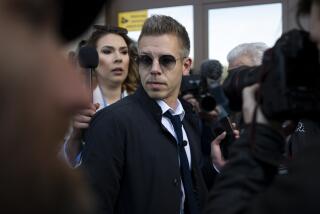Engulfing Wave of Scandals Has Turks Crying for Reform
ISTANBUL, Turkey — The accused--urbane, well coiffed, very rich--drove away from court as usual in luxury sedans.
But one recent afternoon, the television cameras stayed. They went home with the $700-a-month state prosecutor, Sudi Gener--on the bus--trying to learn more about this nation’s seemingly endemic scandals.
Power, money, sex, shots in the night. Glitz and gore enough for a soap opera. They’re all just the most visible part of the “buy anybody” scandals that have undermined public faith in Turkey’s public institutions and are triggering widespread demands here for reform.
“We are dealing here with the fate of society. We believe that to obtain the just, clean administration that we deserve, we must clean away the dirt from the past,” wrote commentator Gungor Mengi last week in the newspaper Sabah amid calls for a special prosecutor.
Thus far, the scandals--unraveling more in the Turkish press than in the courts--show a pattern of collusion and bribery among business people, top politicians and directors of state-owned enterprises.
A lot more goes on under the surface, said Tinaz Titiz, a university professor and former minister and now a member of the Turkish Parliament. “There is corruption at every level, big and small. When people find out that I am in Parliament, they back away; the corruption is assumed,” he said in an interview at his office in Ankara.
Case in point: The high-living family of former President Turgut Ozal is enmeshed in a scandal called Civangate, after a banker who received a $3.5-million payoff for engineering a $100-million loan for a businessman. The trouble started when Engin Civan left his post as head of a large state-owned bank before the loan went through--but wouldn’t repay the bribe.
Ozal’s widow, Semra, was questioned by a prosecutor last week for allegedly calling an underworld boss to involve him in the quest for repayment. She denies it. Shot three times, Civan developed a pressing sense of contrition, talking freely to police.
Corruption is no stranger to Turkish public life. But analysts say it grew exponentially with the breakneck modernization of the 1980s, driven by the dynamic Ozal, who died in April, 1993.
Striking back from beside Ozal’s grave, his politician brother Yusuf Ozal recently defended the family: “I don’t want to talk politics here, but there’s been more corruption in the past year than in the first 70 years of the Turkish republic.”
Relatives of President Suleyman Demirel--although not Demirel himself--have been named in inquiries into state land and loan deals. Prime Minister Tansu Ciller, a millionaire many times over, called a special news conference to explain her wealth and property holdings in New Hampshire.
Scandal is not restricted to particular parties or families. Newspapers sometimes question how the leader of the straight-arrow pro-Islamic Welfare Party got so rich; business leaders close to the party are accused of siphoning funds donated to help Muslims in Bosnia-Herzegovina.
In Istanbul, social democratic administrators used the city water authority as a source of party funds in exchange for contracts. The shenanigans became public after the authority chairman ran off with his secretary, and his wife told all.
“There are no checks and balances in the government or in the judicial system; the system’s not working,” Sabah senior columnist Hasan Cemal said in an interview.
By now, the climate of scandal has all but paralyzed a poorly paid public administration fearful of being tarred.
And popular resentment is already inflicting savage political damage. In one recent poll, 69% agreed that “the state does not fulfill its responsibilities toward its citizens,” and 76.9% agreed that “the state apparatus has become a toy in the hands of politicians.”
In another sobering opinion sample, the army emerged as the country’s most trusted institution; only 20% said they trusted politicians. And as scandals roll on amid triple-digit inflation and a lackluster economy, Turks regard political parties thronging a divided and indecisive Parliament with almost total cynicism: Only 1% say they trust them.
More to Read
Sign up for Essential California
The most important California stories and recommendations in your inbox every morning.
You may occasionally receive promotional content from the Los Angeles Times.










